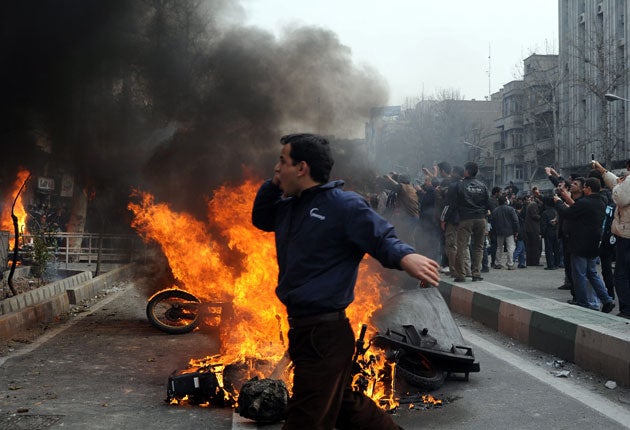Street protests flare in Iran
Nephew of opposition leader Mousavi is among five killed after security forces open fire, say eyewitnesses

Iranian security forces killed at least five people yesterday, including a nephew of the opposition leader Mir Hossein Mousavi, during the fiercest clashes with anti-government protesters in months.
Amateur video footage purportedly from the centre of Tehran showed an enraged crowd carrying away one of the casualties, chanting: "I'll kill the one who killed my brother."
In several locations around the city centre demonstrators fought back against security forces, hurling stones and setting their motorcycles, cars and vans ablaze, according to video footage and pro-reform websites.
A close aide to Mr Mousavi – a main contender in the presidential election in June – said the 35-year-old nephew, Ali Mousavi, died of his injuries in a hospital in Tehran. Mr Mousavi's website and another reformist website, Parlemannews.ir, said he died during clashes in which security forces reportedly fired on demonstrators.
Beyond the capital, there were street protests in at least three other cities: Isfahan and Najafabad in central Iran, and Shiraz in the south. The protesters in Tehran tried to cut off roads with burning barricades. One police officer was photographed with blood streaming down his face.
The protests began with thousands of opposition supporters chanting "death to the dictator," a reference to President Mahmoud Ahmadinejad, as they took to the streets in defiance of official warnings of a harsh crackdown on any demonstrations coinciding with a religious observance on Sunday. Iranians were marking Ashoura, commemorating the seventh-century death in battle of one of Shia Islam's most honoured saints.
Security forces tried, but failed, to disperse protesters on a central Tehran street with tear gas, charges by baton-wielding officers and warning shots fired into the air. Eyewitnesses and the pro-reform website Rah-e-Sabz said they then opened fire directly at protesters, killing at least three people. A fourth protester was shot dead on a nearby street, they said.
Eyewitnesses said one victim was an elderly man who had a gunshot wound to the forehead. He was seen being carried away by opposition supporters with blood covering his face; more than two dozen opposition supporters were injured, some with limbs broken from beatings, according to the same sources.
Yesterday's clashes marked the bloodiest confrontation between protesters and security forces since the height of the unrest in the weeks after the June election. The opposition maintains that President Ahmadinejad won another term in power through massive vote fraud and that Mr Mousavi was the true winner.
Mobile phone services were unreliable and internet connections were slowed to a crawl, as has happened during most other days of protest in an apparent government attempt to limit publicity and prevent protesters from organising gatherings.
Tehran's police chief denied yesterday that officers had fired on the crowd – or even that they had been armed. "No report of a death has been sent to the police," Azizollah Rajabzadeh said, according to the semi-official ISNA news agency. "No one has been killed. Police did not open fire and the officers present did not carry weapons."
The death a week ago of the 87-year-old Grand Ayatollah Hossein Ali Montazeri, who had become a sharp critic of Iran's leaders, has given a new push to opposition protests. Events held in his memory have brought out not only the young, urban activists of previous protests, but also older Iranians who revered Montazeri on grounds of faith as much as politics. Tens of thousands marched in his funeral procession in the holy city of Qom a week ago, many chanting slogans against the government.
In Iraq, a roadside bomb yesterday in Tuz Khormato, 110 miles north-east of Baghdad, killed five Shia pilgrims, and blasts in Baghdad killed two more as millions of Iraqi Shias turned out in processions for Ashoura.
Dozens of pilgrims have been killed and more than 150 wounded in Iraq this year during Ashoura, which concluded yesterday. The attacks are attributed to insurgents hoping to intensify sectarian violence, which has fallen off from its peak in 2006 and 2007.
Join our commenting forum
Join thought-provoking conversations, follow other Independent readers and see their replies
Comments
Bookmark popover
Removed from bookmarks